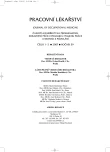Monitoring of Heart Rate during the Training of Divers
Authors:
J. Chaloupka 1,2
Authors‘ workplace:
Klinika nemocí z povolání LF UK a FN Hradec Králové, přednosta Doc. MUDr. Jiří Chaloupka, CSc.
1; Fakulta vojenského zdravotnictví Univerzity obrany Hradec Králové, děkan Prof. MUDr. Roman Prymula, CSc.
2
Published in:
Pracov. Lék., 59, 2007, No. 1-2, s. 21-26.
Category:
Original Papers
Overview
Diving with a self-contained underwater breathing apparatus (SCUBA) is becoming a more and more popular sport and leasure time activity. Professional training of divers is one of the specific professional activities carried on within the framework of Fire Rescue Service of the Czech Republic. Values of heart rate in freshmen undergoing a basic diving training and in experienced divers, participants of a follow up course, were monitored. The values of heart rate during the training drafts in the swimming pool and during the drafts outdoors were monitored. The course of heart rate values were compared to the time record of work of a diver and particular time intervals of the record were compared to the particular working activity undertaken by the diver or an event during the draft. Repeated records are more useful for evaluating reactivity of a particular person to situations under stress. Besides the work load, the comparison of measured values enables evaluation of mental and emotional load which influences significantly overall working capacity. Presented results contribute to the evaluation of an actual state of an organism and the assessment of its physical and mental readiness to full performance. The author also reflects on the organization and quality of providing health care to specialists – divers in the Czech Republic and abroad.
Key words:
heart rate, diving, barotrauma, health care
Sources
1. Goke, M., Knittel, T., Staritz, M., Brost, F., Roder, R., Meyer zum Buschenfelde, K. H. Decompression sickness as differential diagnosis in internal medicine emergency admissions. Dtsch. Med. Wochenschr., 1992, č. 117 (47), s. 1798–1802.
2. Hrnčíř, E. Nemoci způsobené přetlakem. Pracov. Lék., 2006, 58, č. 4, s. 153–164.
3. Jirák, Z., Lvončík, S. Návrh služebního předpisu MV pro potřeby fyziologických laboratoří pro výběr příslušníka z hlediska fyzických předpokladů pro práci v jednotce PO a v přijímacím řízení. Závěrečná zpráva, KHS Ostrava 1997, 51 s.
4. Kukleta, M. Kapitoly z fyziologie potápěče. Praha : Svazarm 1980.
5. Moser, M., Wolf, G. Health hazards associated with flying and diving. ENT aspects. Fortschr. Med., 1990, 25, č. 108, s. 477–481.
6. Muth, C. M., Kemmer, A., Tetzlaff, K. Diving fitness for scuba divers – what the primary care physician should know. 2005, 8, č. 147 (27–28), s. 24–28.
7. Nařízení vlády č. 178/2001, kterým se stanoví podmínky ochrany zdraví zaměstnanců při práci. Sbírka zákonů ČR, částka 68/2001.
8. Nařízení vlády č. 523/2002, kterým se mění nařízení vlády 178/2001, kterým se stanoví podmínky ochrany zdraví zaměstnanců při práci. Sbírka zákonů ČR, částka 180/2002.
9. Spira, A. Diving and marine medicine review part II: diving diseases. J. Travel. Med., 1999, č. 6 (3), s. 180–198.
10. Strauss, M. B., Borer, R. C. Jr. Diving medicine: contemporary topics and their controversies. Am. J. Emerg. Med., 2001, č. 9 (3), s. 232–238.
11. Vyhláška o zdravotní způsobilosti 393/2006 Sb., Sbírka zákonů ČR, částka 124/2006.
12. Weiss, M. Standards on medical fitness examinations for Navy divers. Int. Marit. Health., 2003, č. 54 (1–4), s. 135–143.
Labels
Hygiene and epidemiology Hyperbaric medicine Occupational medicineArticle was published in
Occupational Medicine

2007 Issue 1-2
-
All articles in this issue
- Hyperbaric Oxygenotherapy in Treatment of Children with Neuroblastoma of Highest Risk: Experience in 1997–2000
- Hyperbaric Oxygenotherapy in Traumatology: Therapeutic Results in 2005
- Contribution of Hyperbaric Oxygenotherapy in Comprehensive Therapy of Various Etiology Hypoxic Brain Affections in Children and Adults
- Monitoring of Heart Rate during the Training of Divers
- The Beginning of Hyperbaric Medicine and Oxygenotherapy Specialization in the Czech Republic and its Role in Current Human Medicine
- Hyperbaric Oxygen and Diabetic Foot
- Problem of Sudeck Syndrome
- Transcutaneous Oximetry
- Importance of Hyperbaric Oxygenotherapy in Treatment of Not Healing Defects
- Medical Aspects of Diving
- Medical Examinations of Divers
- Foramen Ovale Patent and Diving
- Occupational Medicine
- Journal archive
- Current issue
- About the journal
Most read in this issue
- Problem of Sudeck Syndrome
- Contribution of Hyperbaric Oxygenotherapy in Comprehensive Therapy of Various Etiology Hypoxic Brain Affections in Children and Adults
- Medical Examinations of Divers
- Transcutaneous Oximetry
